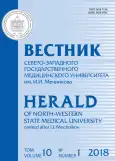Congenital hypopituitarism in children. Molecular-genetic characteristics
- Authors: Berseneva O.S.1, Glotov A.S.2, Glotov O.S.2, Serebryakova E.A.2, Ivashenko T.E.2, Turkunova M.E.1, Bashnina E.B.1, Baranov V.S.2
-
Affiliations:
- North-Western State Medical University named after I.I Mechnikov
- Research Institute of Obstetrics, Gynecology and Reproductology named after D.O. Ott
- Issue: Vol 10, No 1 (2018)
- Pages: 49-54
- Section: Reviews
- URL: https://bakhtiniada.ru/vszgmu/article/view/8812
- DOI: https://doi.org/10.17816/mechnikov201810149-54
- ID: 8812
Cite item
Full Text
Abstract
In connection with the ambiguity in the interpretation of the results of stimulation tests in congenital hypopituitarism, children need to search for molecular genetic markers of the disease. Molecular genetic analysis in patients with congenital hypopituitarism (genes GH1, GHRH, GHRHR,BTK, GHSR, PROP1, POU1F1, HESX1, LHX3, LHX4, SOX3, SOX2, OTX2, GLI2, ARNT2, ARPC5L, DLK1, DRD2, PAX6, RNPC3, SHH, SPCS2, SPCS3), was carried out by new-generation sequencing (NGS) with “Amplisek” technology. All patients with congenital hypopituitarism, who are in a special registry of Saint Petersburg, were included in this study. A difference in the incidence of mutations in patients with multiple deficiency of adenohypophysis hormones (27.7%) and in patients with isolated growth hormone insufficiency (9.6%) was revealed. The mutation frequency of diagnosis in genes responsible for congenital hypopituitarism in patients of Saint Petersburg were studied. Mutations in genes associated with congenital hypopituitarism were identified in 16.3% of patients with pituitary dwarfism (16 of 98). The most commonly diagnosed mutations are changes in gene PROP1. In carrying out the molecular genetic studies of patients with congenital hypopituitarism is necessary to consider the likelihood of the presence of these rare pathologies such as loss of genes GHSR, ARNT2, BTK. Currently conducting molecular genetic studies in patients with congenital hypopituitarism further predicts development of the disease and, if necessary, adjust the ongoing replacement therapy.
Full Text
##article.viewOnOriginalSite##About the authors
O. S. Berseneva
North-Western State Medical University named after I.I Mechnikov
Author for correspondence.
Email: o.berseneva@mail.ru
Russian Federation, Saint Petersburg
A. S. Glotov
Research Institute of Obstetrics, Gynecology and Reproductology named after D.O. Ott
Email: o.berseneva@mail.ru
Russian Federation, Saint Petersburg
O. S. Glotov
Research Institute of Obstetrics, Gynecology and Reproductology named after D.O. Ott
Email: o.berseneva@mail.ru
Russian Federation, Saint Petersburg
E. A. Serebryakova
Research Institute of Obstetrics, Gynecology and Reproductology named after D.O. Ott
Email: o.berseneva@mail.ru
Russian Federation, Saint Petersburg
T. E. Ivashenko
Research Institute of Obstetrics, Gynecology and Reproductology named after D.O. Ott
Email: o.berseneva@mail.ru
Russian Federation, Saint Petersburg
M. E. Turkunova
North-Western State Medical University named after I.I Mechnikov
Email: o.berseneva@mail.ru
Russian Federation, Saint Petersburg
E. B. Bashnina
North-Western State Medical University named after I.I Mechnikov
Email: o.berseneva@mail.ru
Russian Federation, Saint Petersburg
V. S. Baranov
Research Institute of Obstetrics, Gynecology and Reproductology named after D.O. Ott
Email: o.berseneva@mail.ru
Russian Federation, Saint Petersburg
References
- Эндокринные заболевания у детей и подростков. Руководство для врачей / Под ред. Е.Б. Башниной. – М.: ГЭОТАР-Медиа, 2017. – 416 с. [Jendokrinnye zabolevanija u detej i podrostkov. Rukovodstvo dlja vrachej. Ed by E.B. Bashninoj. Moscow: GJeOTAR-Media; 2017. 416 p. (In Russ.)]
- Alatzoglou K, Kular D, Dattani M. Autosomal Dominant Growth Hormone Deficiency (Type II). Pediatr Endocrinol Rev. 2015;2(4):347-355.
- Fofanova O, Evgrafov O, Polyakov A, et al. A novel splicing mutation in exon 4 (456G>A) of the GH1 gene in a patient with congenital isolated growth hormone deficiency. Hormones (Athens). 2006;5(4): 288-294.
- Дедов И.И., Петеркова В.А. Детская эндокринология. Руководство. – М.: Универсум паблишинг, 2006. – 595 с. [Dedov II, Peterkova VA. Detskaja jendokrinologija. Rukovodstvo. Moscow: Universum publishing; 2006. 595 p. (In Russ.)]
- Гаврилова А.Е., Нагаева Е.В., Ширяева Т.Ю., и др. Клинико-генетические особенности пациентов с множественным дефицитом гормонов аденогипофиза, обусловленным мутациями в гене PROP1: эффективность терапии рекомбинантным гормоном роста // Проблемы эндокринологии. – 2017. – Т. 63. – № 2. – С. 72–81. [Gavrilova AE, Nagaeva EV, Shiryaeva TYu, et al. Clinical and genetic features of patients with multiple anterior pituitary hormone deficiency caused by mutations in the PROP1 gene; the efficacy of recombinant growth hormone therapy. 2017;63(2):72-81. (In Russ.)]. doi: 10.14341/probl201763272-81.
Supplementary files







